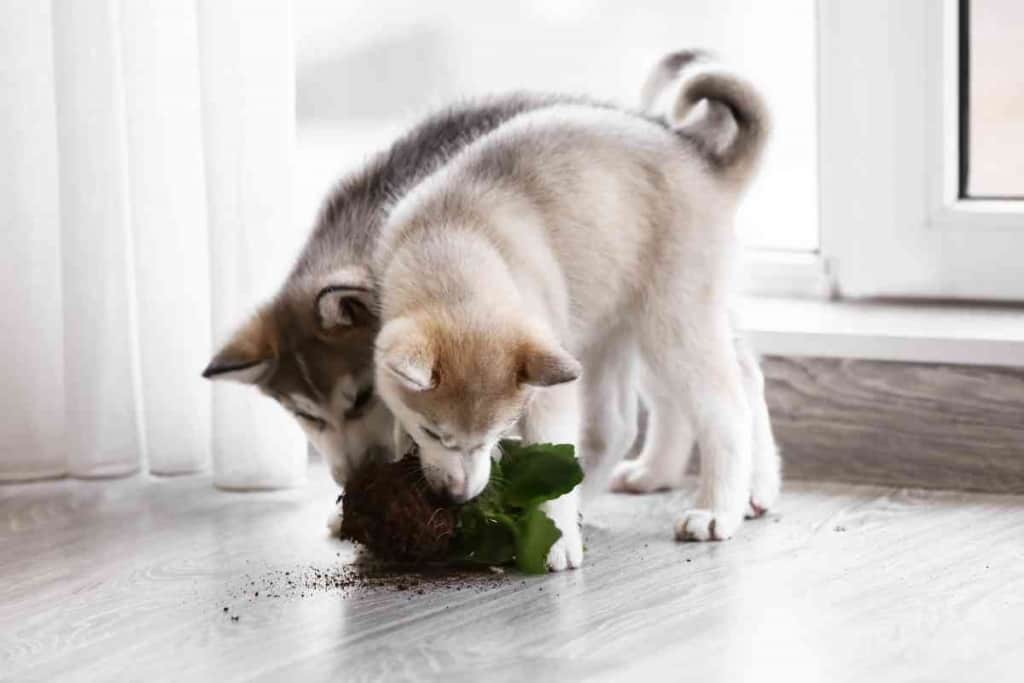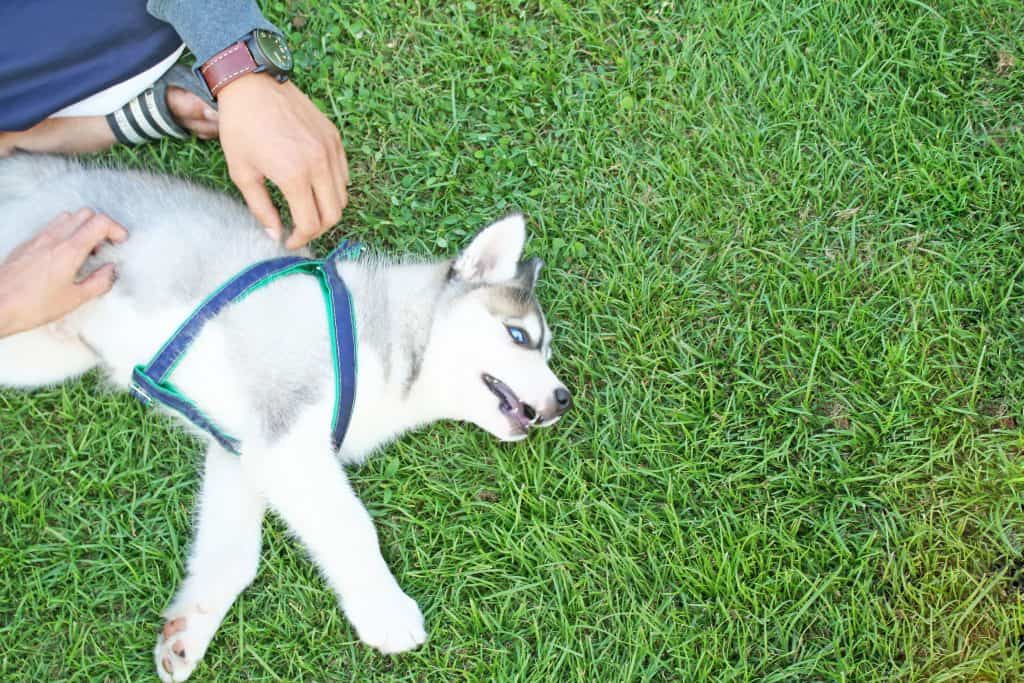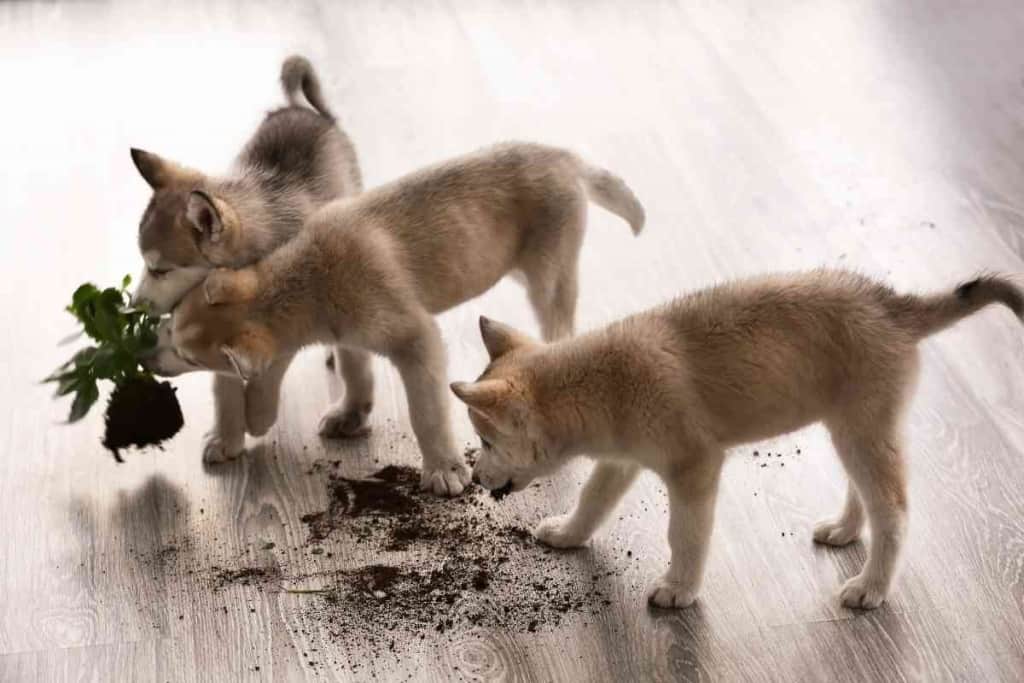Husky Pups – Teething, Biting, and Chewing: Will It Ever Stop?
As a dog owner, one of the things you may be wondering is, “when will my husky pup stop biting and chewing everything in sight?” If so, you’re not alone. This stage can last anywhere from several weeks to several months, and during that time, your house will be turned upside down.
Not only are you constantly picking up teeth marks and chew toys, but your pup is also getting into everything they shouldn’t be.

When will my Husky puppy grow out of biting and chewing?
Huskies usually reach adulthood around 18 months old, and at this point, their biting should stop. However, during the teething process, which usually lasts until they’re around six months old, their chewing and biting habits may continue.
It’s hard to believe that our little furry balls of fluff will one day grow into big, powerful dogs. But with every stage of their growth comes new challenges for both pup and parent.
It can be frustrating when your little one won’t stop gnawing on everything in sight, but luckily there are ways to make it through this stage.
This article will discuss when teething stops for huskies, how to deal with biting and chewing, and some helpful tips to make life a little easier.
We spent countless hours scouring the internet for advice, and we hope that this article will provide some clarity during this tough stage.
When Do Huskies Lose Their Teeth?
Huskies are known for their friendly dispositions. They are also one of the longest-lived dog breeds, with many huskies living well into their teens.
However, like all dogs, huskies eventually lose their baby teeth and grow a new set of adult teeth. So, when do huskies lose their teeth? The answer isn’t as straightforward.
Some huskies will start to lose their baby teeth as early as three months old, while others may not lose them until they are six months old.
In general, though, most huskies will have lost all of their baby teeth by the time they are seven or eight months old. After that, they will have a full set of permanent adult teeth.
The process of losing baby teeth and growing adult teeth is called teething. For most dogs, the teething process is relatively straightforward and causes only minor discomfort.
However, some dogs may experience more discomfort and may even develop mouth sores.
If your husky is experiencing discomfort, you can give them cool, wet towels to chew on or rawhide bones. You can also consult your veterinarian for other options.

How to Deal With Biting and Chewing
Once your husky has all of its adult teeth, it should no longer be chewing on everything in sight. Unfortunately, that doesn’t always happen.
Some dogs may continue to mouth and chew on things even after they have lost their baby teeth. This behavior is often seen in puppies who are teething, but it can also happen with older dogs.
It’s important to nip biting in the bud early on, as it can become a bigger problem down the road.
If your dog is still mouthing and chewing on things, there are a few things you can do to help discourage this behavior.
First, make sure that your dog has plenty of chew toys to keep them occupied.
This will help redirect their chewing behavior and give them something to focus on other than your fingers or shoes.
You can also try using a bitter-tasting spray on things that you don’t want your dog to chew.
This will deter them from chewing on those items and may help teach them what is acceptable to chew on. Finally, you can consult your veterinarian for advice if all else fails.
They may recommend a type of collar or harness that will prevent your dog from being able to reach its mouth with its paws.
Tips for Dealing With Chewing

Here are a few additional tips that may help you deal with your husky’s chewing habits:
- Supervise your dog while they are chewing to make sure they are not swallowing anything they shouldn’t
- Give them plenty of exercises to help tire them out and discourage chewing
- Avoid using your hands or fingers as chew toys, as this can encourage aggressive behavior
- Be patient! This is just a phase that all dogs go through, and it will eventually end.
At What Age Do Huskies Stop Biting?
Huskies are known for their love of play, and biting is often a part of that. Puppies will typically start to mouth and bite their owners as early as eight weeks old.
While it may be painful, this behavior is generally harmless and is simply the pup’s way of exploring the world. However, as the dog matures, this behavior can become a problem.
Huskies reach adulthood around 18 months old, and at this point, their biting should stop.
If it doesn’t, it’s important to seek professional help. A behaviorist or trainer can teach the dog appropriate ways to play and can help discourage biting.
With proper care, most huskies will outgrow their biting habits and go on to enjoy a lifelong friendship with their owners.
Do Huskies Ever Stop Chewing?
Yes, eventually, huskies do stop chewing. However, it may take some time and patience on your part. Chewing is just one way that puppies play and explore their world.
It is also how they relieve the discomfort of teething.
What You Need To Look Out For During Teething
During the teething process, keeping an eye on your husky is important. Here are a few things to look out for:
Excessive Drooling
This is normal during teething and should subside once all of the adult teeth have come in. If the drooling is excessive, it could be a sign of mouth pain or infection.
Loss of Appetite
Some dogs may lose their appetite during teething due to the discomfort they are experiencing. If this happens, try offering soft, bland foods that are easy to chew.
Mouth Sores
These can occur during teething and may make your dog uncomfortable. If you notice any sores, you should take them to the vet as they may require treatment.
Chewing On Everything In Sight
This is a common symptom of teething and is often the most frustrating for owners. Be sure to provide your dog with plenty of chew toys and discourage them from chewing on things they shouldn’t.
Excessive Barking or Crying
Dogs may bark or cry more during teething due to the pain they are feeling. If this becomes excessive, you may want to consult your veterinarian for pain relief options.
If you notice any of these signs, it’s important to consult your veterinarian.
They can help determine if your dog is experiencing discomfort and may recommend some pain relief options. Additionally, they can give you advice on how to deal with chewing and biting during this time.
Recommended Reading on Huskies
- Husky Puppies – How To Take Care Of A Husky Puppy
- Husky Pups – Teething, Biting, and Chewing
- Husky Temperament: What’s it Like Owning One?
- Huskies as Pets: Costs, Life Expectancy, and more
- Are Huskies Good with Kids? A Guide for Parents
- How big do Huskies get? (Plus size info for Husky mixes)
- 5 Factors Affecting How Much Huskies Costs
- Husky Rescue Guide
- At What Age Do Huskies Stop Growing?
- The Ultimate Guide to What Huskies Can (And Can’t) Eat
- How to Get Huskies to Calm Down (Answered!)
Frequently Asked Questions
What are some effective teething toys for Huskies?
When it comes to teething toys, it’s important to find something that is durable and safe for your Husky to chew on. Some popular options include KONG toys, Nylabones, and rubber balls. You can also freeze a wet washcloth and give it to your Husky to chew on for some relief.
How does the teeth of a Husky differ from that of a wolf?
While Huskies are descended from wolves, their teeth have evolved to better suit their diet and domestic lifestyle. Huskies have shorter, blunter teeth than wolves, and their molars are better suited for grinding than tearing.
What are some homemade treats for Huskies during teething?
There are many homemade treats you can make for your Husky during teething. Some popular options include frozen bananas, sweet potato chews, and pumpkin puree frozen in ice cube trays.
What is the tooth chart for Huskies and how can it help with teething?
The tooth chart for Huskies shows the order in which their teeth come in and fall out. By knowing which teeth your Husky should have at different stages of their life, you can better monitor their teething progress and ensure that everything is happening as it should.
How long does the teething period last for Huskies?
The teething period for Huskies typically lasts from three to six months, although it can vary from dog to dog. During this time, your Husky will experience discomfort and may chew on things they shouldn’t in an attempt to soothe their sore gums.
At what age do most puppies, including Huskies, stop teething?
Most puppies, including Huskies, stop teething around six to eight months of age. By this time, all of their adult teeth should have come in and their teething phase should be over.
